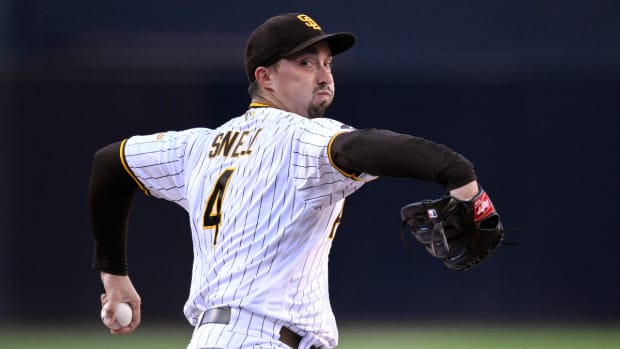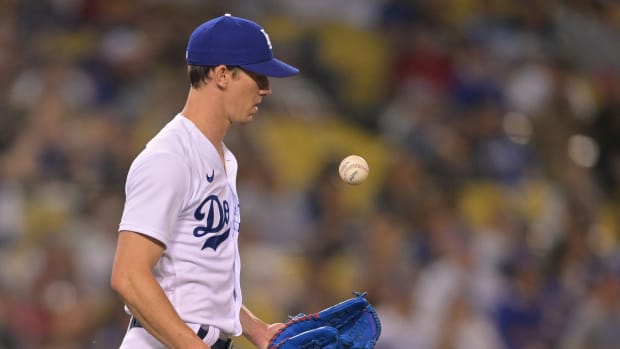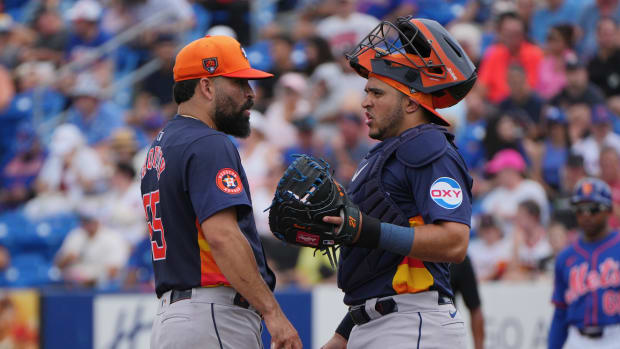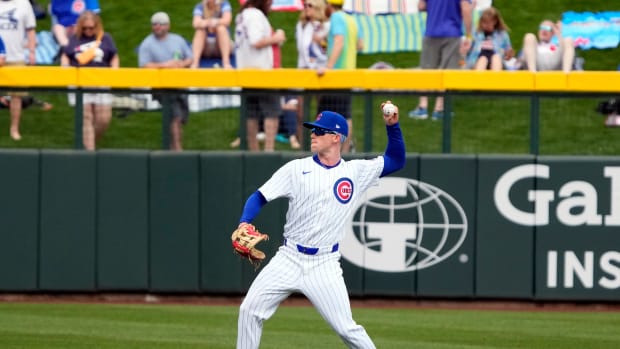
Swisher's curious move to Cleveland
Nick Swisher has hit 20 or more homers in each of his eight full seasons in the majors. (Elsa/Getty Images)
Another big-name free agent has come off the board. Nick Swisher, who spent the past four seasons with the Yankees, agreed to a four-year, $56 million deal with the Indians. The price tag itself is a reasonable one, but the move is something of a headscratcher with regards to both Swisher's new team and his old one. Simply put, while the Indians could use Swisher's production, they don't look poised to contend anytime soon, and they run the risk of him declining due to age by the time they've built a strong enough team around him. The Yankees, on the other hand, are a team built to win now, but they'll have a hard time doing so without an adequate replacement for his production.
Swisher, who turned 32 in November, is coming off a fairly typical year in which he hit .272/.364/.473 with 24 homers in 624 plate appearances, numbers that were only a few points off the work he had done in the previous three years with the Yankees, and a dead ringer for his career norms. However, his year -- and his tenure with the Yankees -- ended on a sour note; he went 5-for-30 in the postseason, and after Game 2 of the ALCS, verbalized his disappointment at being booed by fans in the Bronx. His October slump was part of an ongoing pattern in which he has hit just .162/.252/.308 in 148 plate appearances over the past four postseasons, never driving in more than one run in any playoff series for the Yankees.
Yankees general manager Brian Cashman has downplayed Swisher's postseason struggles in the past, and said nothing to suggest that they were the reason the team let him go. Rather, the Yankees are in cost-cutting mode this winter, with the goal of positioning themselves so as to get below the $189 million luxury tax threshold in 2014, which under last year's Collective Bargaining Agreement would not only reset their marginal tax rate from 50 percent down to 17.5 percent, but also allow them to receive huge rebates with regards to revenue sharing. The Yankees had a $209.8 million payroll in 2012, and while they already have $189.5 million committed for 2013, they have just $81.6 million committed for 2014. With one exception, all of the contracts they've dished out this winter -- to Hiroki Kuroda, Andy Pettitte, Mariano Rivera and Kevin Youkilis -- have been one-year deals; Ichiro Suzuki's two-year, $13 million deal is the exception. Meanwhile, both Curtis Granderson and Robinson Cano will be free agents after the 2013 season, and the Yankees apparently feel they will at best be able to sign only one of those two -- almost certainly Cano -- to a long-term extension.
Within those constraints, the Yankees apparently felt there was no way they could accommodate Swisher on a long-term deal, particularly given that he was said to eye a deal akin to Jayson Werth's seven-year, $126 million contract with the Nationals. With other big-spending teams such as the Dodgers, Angels, Red Sox and Rangers focused elsewhere, Swisher didn't get half that, at least in guaranteed money, though a $14 million vesting option for 2017 brings the potential total value of the contract to $70 million. His most serious interest came from the Indians, who drew on his connections to Ohio State University by inviting former football coach Jim Tressel to lunch when he toured the facilities last week.
For the Indians, Swisher will take over right field duties from Shin-Soo Choo, who was traded to the Reds in a deal that brought back starter Trevor Bauer and outfielder Drew Stubbs earlier this month. A more powerful hitter and a more durable player than Choo, he's a slight upgrade; he was worth 3.7 Wins Above Replacement Player this year, a whisker above his 3.6 average over the past four years; only in 2008, his lone year with the White Sox, has he been worth less than 3.0 WARP. Choo, who's about a year-and-a-half younger, has averaged 3.8 WARP over the past five seasons, but has been worth a total of just 4.3 WARP over the past two years, including 3.1 in 2012. Swisher will become the team's highest-paid player, making $11 million in 2013; not including the deals of the arbitration eligible Justin Masterson, Chris Perez, Mike Aviles and Drew Stubbs, Cleveland has just $35.2 million committed for 2013, and they may well come in lower than last year's $65.4 million.
The Indians have a maturing core of players around which to build in catcher Carlos Santana (27 in April), second baseman Jason Kipnis (26 in April), shortstop Asdrubal Cabrera (27) and outfielder Michael Brantley (26 in May), but that group underachieved along with the rest of the roster in 2012; Brantley was the only one whose offense improved over 2011. The addition of 29-year-old free agent Mark Reynolds to play first base and the 28-year-old Stubbs to play center adds another pair of underachievers to the fold, and bumps Brantley into a position where the offensive bar has been raised. While there's certainly some room for growth and improvement among that group, it's not a lineup that's likely to contend anytime soon so long as it's backed with a pitching staff and defense that hasn't substantially changed after allowing a league-worst 5.22 runs per game and ranking second-to last with 6.8 strikeouts per nine. While Bauer is a top prospect who may well blossom into a frontline starter, holdovers Masterson, Zack McAllister and Ubaldo Jimenez and Tommy John surgery returnee Carlos Carrasco don't equal a contender-caliber rotation.
Given that collective mess, adding Swisher is an oddly timed move; his salary would be better spent on pitching or stashed for a later day. From the looks of things, the Indians are falling into the deadly trap of building a team that might get them back towards .500, but that doesn't seem likely to move the needle in a market that's been last or second-to-last in the league in attendance in three of the past four years; they rose to ninth when they went 80-82 in 2011, but even then, attendance was down nearly 20 percent relative to their 81-81 season in 2008. The best that can be said for Swisher's contract is that it's a fair deal that shouldn't be too difficult to trade a couple years down the road if they need to do so -- though if he declines, it becomes more problematic.
the Yankees let Russell Martin escape
A.J. Pierzynski



































